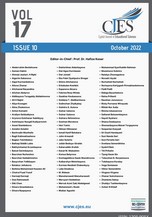High school students' mathematical proficiency based on mathematics anxiety and cognitive independence
High school students' mathematical proficiency based on mathematics anxiety and cognitive independence
Author(s): Muhammad Syarifuddin Rahman, Dwi Juniati, Manuharawati ManuharawatiSubject(s): School education, Educational Psychology, Cognitive Psychology, Pedagogy
Published by: Birlesik Dunya Yenilik Arastirma ve Yayincilik Merkezi
Keywords: analytical strategy; cognitive independence; mathematical proficiency; mathematics anxiety; trial-error strategy;
Summary/Abstract: Mathematical proficiency is the ability to use conceptual understanding, procedural fluency, strategic competence, adaptive reasoning, and productive disposition in problem-solving. This study aims to determine the effect of mathematics anxiety level and cognitive independence level on mathematical proficiency. This research combined quantitative and qualitative methods to determine the effect of mathematics anxiety and cognitive independence on mathematical proficiency. It used the multiple linear regression test for the quantitative approach. Moreover, the qualitative approach was used to see the effect of anxiety level and cognitive independence on mathematical proficiency. One hundred fifty-five high school students participated in this study, and it was found that mathematics anxiety affects mathematical proficiency negatively while cognitive independence affects mathematical proficiency positively. Students who have high mathematics anxiety use trial and error strategies, while their counterparts, having low mathematics anxiety, use analytical strategies. Students with high cognitive independence can process the information and tend to be independent, while those with low cognitive independence do so illogically and tend to need help from others. The results of this study are hoped to be beneficial for teachers in choosing learning methods.
Journal: Kıbrıslı Eğitim Bilimleri Dergisi
- Issue Year: 17/2022
- Issue No: 10
- Page Range: 3740-3754
- Page Count: 15
- Language: English

